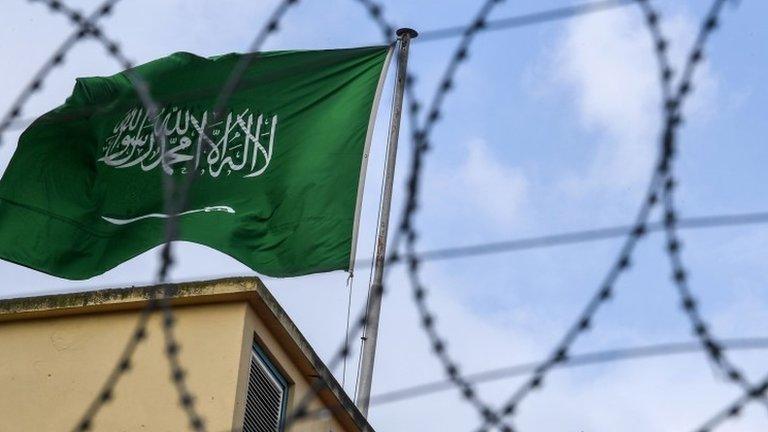Rahaf al-Qunun: UN 'considers Saudi woman a refugee'
- Published
The #SaveRahaf campaign went viral after Rahaf started tweeting about her plight for asylum
A Saudi woman who fled her family and refused to leave a Bangkok hotel has been declared a legitimate refugee by the UN, the Australian government says.
Rahaf Mohammed al-Qunun, 18, refused to board a flight from Bangkok to Kuwait on Monday and barricaded herself into her airport hotel room.
She said she had renounced Islam, which is punishable by death in Saudi Arabia.
The UN's refugee agency has referred her case to Australia for possible resettlement.
Thai immigration officials had initially said she should return to Kuwait, where her family were waiting. She then started a social media campaign, live-tweeting her case and attracting international attention.
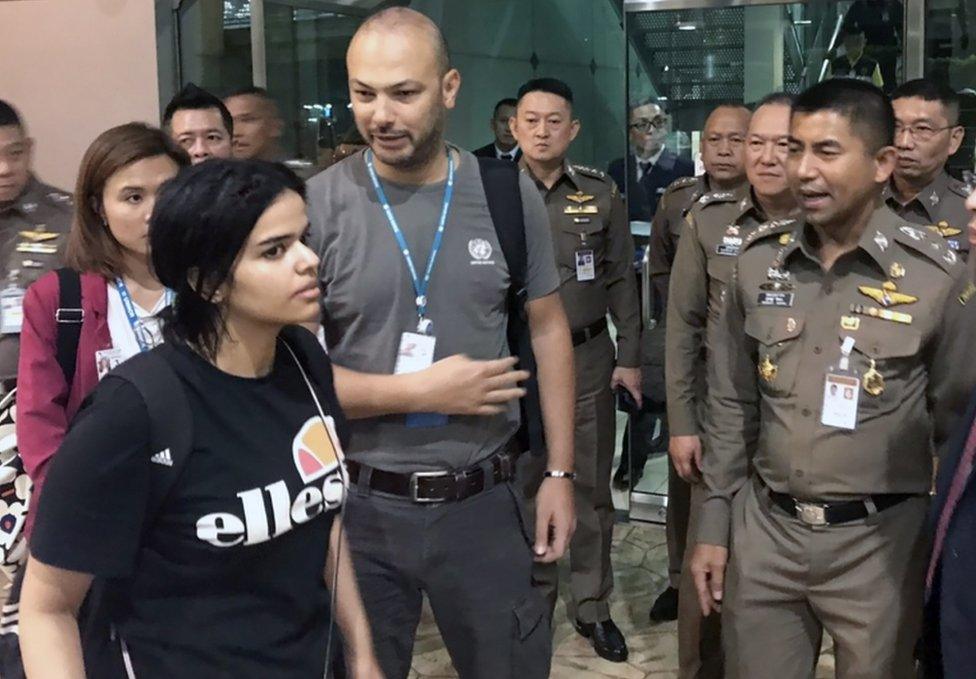
Rahaf Mohammed al-Qunun, pictured at Bangkok airport, says she "wants to be free" away from Saudi Arabia
In a brief statement, Australia's Department of Home Affairs said it would "consider this referral in the usual way".
Ms Mohammed al-Qunun posted a message on Twitter following the announcement, saying: "Don't let anyone break your wings, you're free. Fight and get your rights!"
Allow X content?
This article contains content provided by X. We ask for your permission before anything is loaded, as they may be using cookies and other technologies. You may want to read X’s cookie policy, external and privacy policy, external before accepting. To view this content choose ‘accept and continue’.

Refugee status is normally granted by governments, but the UNHCR can grant it where states are "unable or unwilling to do so", according to its website, external. The UNHCR says it does not comment on individual cases.
Now that Ms Mohammed-al Qunun has been given this status, another country must agree to take her in.
Officials in Australia have hinted that her request will be accepted.
"If she is found to be a refugee, then we will give very, very, very serious consideration to a humanitarian visa," Health Minister Greg Hunt told the ABC network before the UN determination was made public.
But Home Affairs Minister Peter Dutton warned there would be "no special treatment" for Ms Mohammed al-Qunun.

'Rahaf is an inspiration'
'Sara', Saudi woman speaking to BBC OS on the World Service
Rahaf is an inspiration. But she's not the first one who did this and definitely not the last one.
What we are going through is awful. We think about this every day because us women here do not know what it feels like to go out. We don't know what freedom tastes like.
Dad keeps my passport with him all the time, we go to hotels and he puts it next to him when he sleeps.
Unfortunately it's not a revolution. Every girl that is tweeting about this, it's either that she has already escaped or she's using a fake account like me. Some people tweeted me or DMed me to tell me to use my real account, for me to be brave.
We do not want the guardianship any more. I want to go out of the house and drink coffee from Starbucks. I don't have to take my whole family. This is just way too harsh on us.
Living this life is exhausting.

Why did she claim asylum?
Renunciation of Islam is punishable by death in Saudi Arabia.
"My life is in danger," she told the Reuters news agency. "My family threatens to kill me for the most trivial things."
A spokesperson for her family told the BBC that they did not wish to comment and all they cared about was the young woman's safety.
Campaign groups like Human Rights Watch (HRW) have expressed grave concerns for Ms Mohammed al-Qunun.
Phil Robertson, Deputy Asia Director off HRW, told Reuters: "She said very clearly that she has suffered both physical and psychological abuse. She said she has made a decision to renounce Islam. And I knew once she said that, she is in serious trouble".
On Tuesday morning she retweeted her original appeal for asylum, pleading for the UK, Canada, the US or Australia to take her in.
Allow X content?
This article contains content provided by X. We ask for your permission before anything is loaded, as they may be using cookies and other technologies. You may want to read X’s cookie policy, external and privacy policy, external before accepting. To view this content choose ‘accept and continue’.

How did the case unfold?
Ms Mohammed al-Qunun says she was on a trip to Kuwait with her family when she fled on a flight on 4 January.
She was trying to head to Australia via a connecting flight in Bangkok.
Because she did not have a visa to enter Thailand, Thai police had denied her entry and were in the process of repatriating her, an official said.
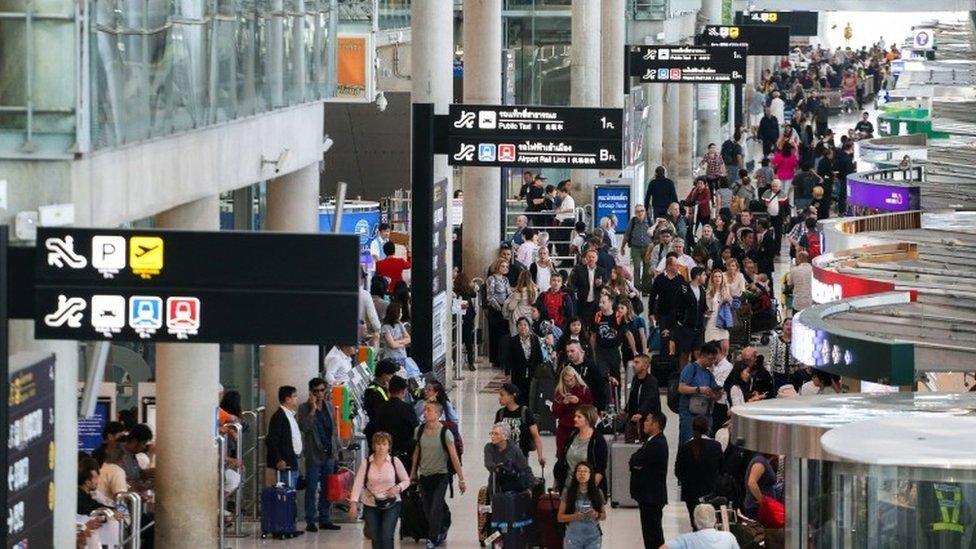
Police in Thailand had denied entry to the woman and were in the process of repatriating her
She began to live-tweet her ordeal, sharing her Twitter password with friends so they too could assist in spreading the message on social media. But some social media users in her own country strongly criticized her actions.
A video showed how she resisted deportation efforts by hiding in an airport hotel room, putting a table against the door to stop people from entering.
She told the BBC: "I shared my story and my pictures on social media and my father is so angry because I did this... I can't study and work in my country, so I want to be free and study and work as I want."
Ms Mohammed al-Qunun has been housed in a secure location in Bangkok since Monday night, when the Thai government allowed her to leave the airport.
Her father and brother have arrived in Thailand but she is refusing to see them.
Thailand's immigration chief Surachate Hakparn said the pair would remain there until it was clear where Ms Mohammed al-Qunun would receive asylum.
Mr Surachate said the father had denied allegations that the family were abusing her physically and emotionally.
"He wanted to make sure that his daughter was safe... he told me that he wanted to take her home," he said.
What is Australia's policy on asylum seekers?
Many asylum seekers have tried to reach Australia on boats from Indonesia, often paying large sums to people smugglers. Hundreds have died. In 2013, the government introduced tough new policies to "stop the boats".
Military vessels patrol Australian waters and intercept migrant boats, often towing them back to Indonesia. This and other policies have significantly curbed the number of boat journeys.
Hundreds of asylum seekers who reached Australian shores years ago are held in offshore processing centres, which rights groups say expose them to widespread psychological harm.
But the country has taken 656 refugees per 100,000 people through UN refugee agency resettlement schemes, external, more than twice as many as the United States.
- Published8 January 2019
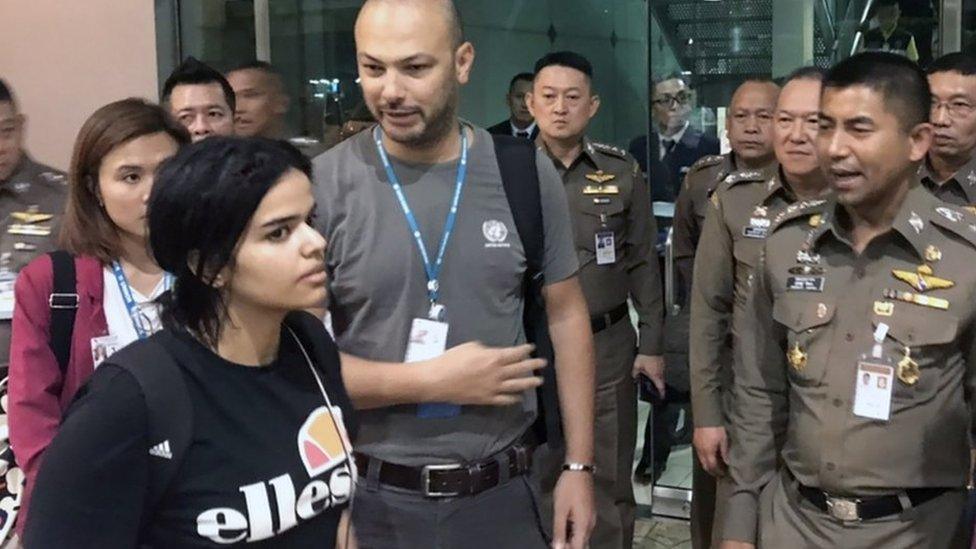
- Published15 October 2018
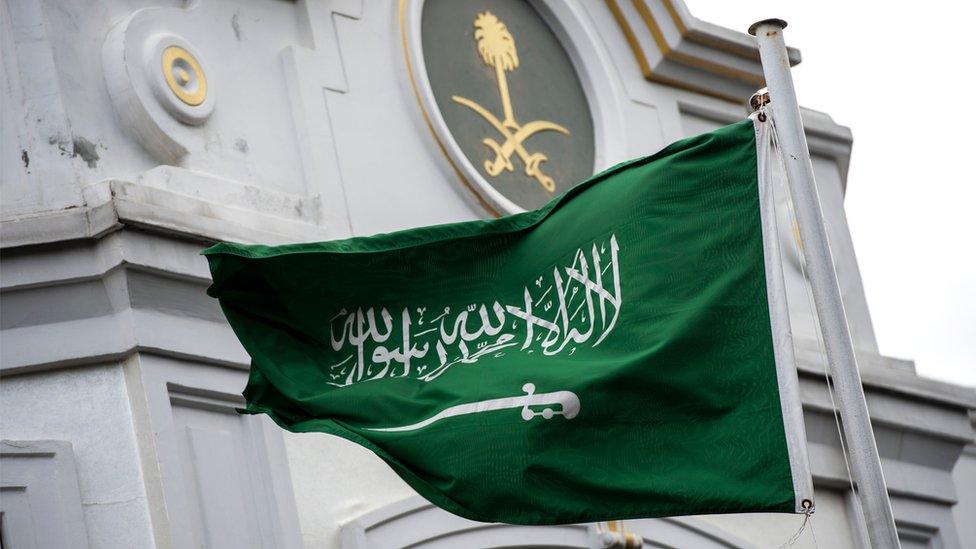
- Published21 November 2018
